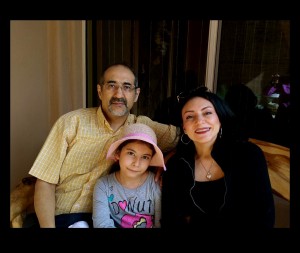WSJ’s Farnaz Fassihi reported on the run-up to Iran’s February 11 anniversary demonstrations, including news of Kian’s appeal:
“BEIRUT—Iranian authorities deployed in force across Tehran Wednesday to conduct last-minute security sweeps and warn residents to refrain from joining antigovernment protests planned for Thursday.
The government typically orchestrates large, carnival-like rallies and demonstrations to mark the anniversary of the Islamic Republic. For this year’s events on Feb. 11, the day marking the culmination of the annual celebrations, opposition leaders have called for protesters to demonstrate against the regime. That has set the stage for clashes between authorities and demonstrators, who have taken to the streets repeatedly to protest the outcome of presidential elections in June.
Government officials, meanwhile, ratcheted up threats against any protests Thursday, vowing to confront demonstrators on the streets and calling for government supporters to turn out in large numbers. Iranian officials have branded protesters as agents of foreign powers.
The Iranian judiciary has handed down a number of harsh sentences against protesters arrested in previous demonstrations, including at least 10 pending death sentences.
On Wednesday, semi-official news services and opposition Web sites reported last-minute attempts by police and plain-clothes militia to suppress antigovernment demonstrations.
Basij militia took over a large bus and taxi station in western Tehran, shutting it down and draping a banner over the terminal stating the area will serve as headquarters for security forces.
Iranian Web sites said the bus terminal would also be used by security forces coming in from the provinces to help suppress protests in the capital.
The government typically buses in large numbers of government supporters from outlying regions to Tehran to participate in rallies.
Meanwhile, human-rights groups in Iran reported late Wednesday that 19 mothers whose children were killed in previous post-election unrest, had been detained by authorities.
Iran’s telecommunications agency announced what it described as a permanent suspension of Google Inc.’s email services, saying instead that a national email service for Iranian citizens would soon be rolled out. It wasn’t clear late Wednesday what effect the order had on Google’s email services in Iran.Iranians have reported widespread service disruptions to Internet and text messaging services, though mobile phones appeared to be operating normally Wednesday.
Google didn’t have an immediate comment about the announcement.
Police have also confiscated satellite dishes from residential roof tops, according to opposition Web sites. Some pedestrians have been quoted on opposition Web sites saying that their mobile phones were searched and, in some cases, taken by police patrolling areas of the capital where protests have erupted in the past.
Iranian authorities tasked with upholding Islamic values have also been scouring the streets, harassing people wearing green, the trademark color of the opposition, according to witness accounts posted on opposition Web sites.
Basij forces, the mostly volunteer corps of progovernment militia, have distributed flyers to homes in many neighborhoods, saying that progovernment supporters “will confront the enemies of Islam” in any protests Thursday.
In south Tehran, Basij members came in a caravan of 15 motorbikes, according to several opposition sites, whose accounts corroborated with each other. They knocked on doors and handed out flyers, or threw them over the street-side walls of residential compounds, the reports said.
Iran’s Revolutionary Guard Corps, the country’s elite security force, has deployed its troops along routes planned for the opposition demonstrations on Thursday.
Local media have been warned to avoid provocative headlines and not to cover protests not sanctioned by the state. The few foreign reporters still accredited to work in Iran have been told they can only cover government celebrations, and are banned from interviewing opposition supporters or regular citizens.
Political dissidents and activists who were recently released from jail have been called in by the intelligence ministry in the past few days and warned not to take part in demonstrations on Thursday, according to a report by the Organization to Defend Human Rights and Democracy in Iran, a local human-rights group.
Opposition leaders don’t appear to be backing down. Mehdi Karroubi, a former presidential candidate, said Wednesday he will march peacefully from a neighborhood in west Tehran towards the capital’s Azadi Square Thursday morning.
Opposition Web sites reported that former president Hashemi Rafsanjani, an opposition leader, held an emergency meeting with Supreme Leader Ayatollah Ali Khamenei on Monday night, complaining about the heavy-handed crackdowns ahead of Feb. 11 and calling for “the end of shameful actions” against protesters.
Despite the crackdown, authorities Wednesday appeared to also signal some flexibility. Iran’s Revolutionary Court on Wednesday reduced the prison sentence of Iranian-American scholar Kian Tajbakhsh to five years in from 15, in an appellate hearing. Mr. Tajbakhsh was sentenced on charges of plotting against national security.
Alireza Beheshti, a top aide to opposition leader Mir Hossein Mousavi, was released from prison Tuesday night in critical condition, after suffering a heart attack in Evin prison this week, according to opposition Web sites.”


 Sting makes appeal for Kian Tajbakhsh and Iranian detainees.
Sting makes appeal for Kian Tajbakhsh and Iranian detainees.